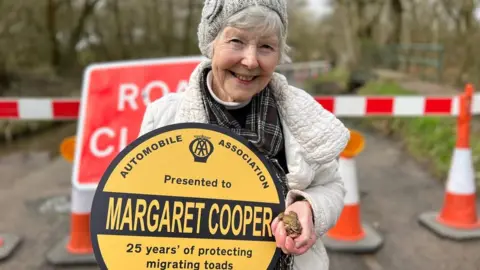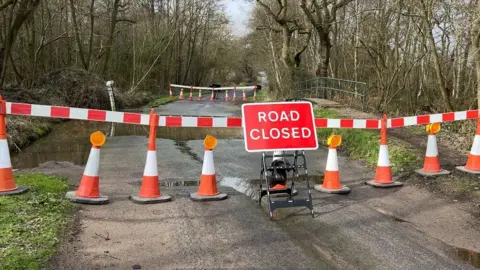Oxton: World's first toad closure celebrates 25 years
 BBC
BBCA woman who successfully campaigned for what is thought to be the world's first toad road closure has been recognised for her work.
Beanford Lane in Oxton, Nottinghamshire, closes in March every year to allow toads to cross safely during migration.
Villager Margaret Cooper has been presented with a personalised sign by the AA to mark 25 years of the closure.
She raises hundreds of pounds every year to pay for the toad crossing.
Mrs Cooper was presented with a commemorative disc by the AA. She said: "It's marvellous, I'm really, really thrilled. It's really kind, it really is."

She campaigned for a toad crossing in Oxton in 1999 because she was concerned too many of them were being killed.
She said: "They would start on this pilgrimage. It's a very hazardous journey indeed.
"That's why here, during March, they're safe and they can cross without being squashed. We actually reclaim this area for one month of the year for wildlife."
Nottinghamshire County Council became the first authority in the world to temporarily close a public highway to protect toads following Mrs Cooper's campaign, according to the Nottinghamshire Wildlife Trust.
Why do toads cross the road?
Toads like to go back to their ancestral breeding ground during mating season in March.
They travel for a mile or more to make the journey every year, regardless of risks, like crossing the road.
The wildlife trust estimates that "20 tonnes of toads are killed on UK roads every year".
When Mrs Cooper first got the road in Oxton closed 25 years ago, she estimated 1,000 toads would cross there every month, but she thinks numbers have dwindled.
She added: "Now it's no more than 100 or two, and that's really worrying. This is reflected nationally. So that's why every bit of help we can give them is really important."

Follow BBC East Midlands on Facebook, on X, or on Instagram. Send your story ideas to [email protected] or via WhatsApp on 0808 100 2210.
